
ALSO BY KAREN ELIZABETH GORDON
The Deluxe Transitive Vampire: The Ultimate Handbook of Grammar for the Innocent, the Eager, and the Doomed
The New Well-Tempered Sentence: A Punctuation Handbook for the Innocent, the Eager, and the Doomed
The Red Shoes and Other Tattered Tales
The Ravenous Muse: A Table of Dark and Comic Contents, A Bacchanal of Books
Paris Out of Hand: A Wayward Guide
The Disheveled Dictionary: A Curious Caper Through our Sumptuous Lexicon
Torn Wings and Faux Pas: A Flashbook of Style, A Beastly Guide Through the Writers Labyrinth

MY DEAR MOTHER

STORMY, BOASTFUL, AND TENDER LETTERS BY DISTINGUISHED SONSFROM DOSTOEVSKY TO ELVIS
collected and annotated by
Karen Elizabeth Gordon and Holly Johnson
ALGONQUIN BOOKS OF CHAPEL HILL
Published by
ALGONQUIN BOOKS OF CHAPEL HILL
Post Office Box 2225
Chapel Hill, North Carolina 275152225
a division of
WORKMAN PUBLISHING
225 Varick Street
New York, New York 10014
1997 by Karen Elizabeth Gordon and Holly Johnson. All rights reserved.
For permission to reprint letters and poems in this volume, grateful acknowledgment is made to the holders of copyright, publishers, or representatives named on pages 2019, which constitute an extension of the copyright page.
Letters in this volume have been set as the originals, retaining idiosyncrasies in spelling and usage. Bracketed ellipses are used to indicate when material has been omitted by the editors.
Library of Congress Cataloging-in-Publication Data is available.
E-book ISBN 978-1-56512-784-5
For Henri de Toulouse-Lautrec, our beloved inspiration,and for our mothers, whose sons we are:Camilla Honey Hall Collins and Anne Michalov Johnson
Im beginning to think that the proper definition of Man is an animal that writes letters.
LEWIS CARROLL
CONTENTS

ACKNOWLEDGMENTS

F or succor, support, hospitality and invaluable contributions, Holly Johnson wishes to thank Louise Boursua, the British School at Rome Library, William Donker, Suzanne Guest, the University of Bristol Library, the University of Bristol Art History Department, the Lewis and Clark College Library, Sacramento Rotary, Stanley Weintraub, Suzanne Nelson, Milo Radulovich, Darby Patterson, Philip Windwood, Marsha White, Brooks Koenig, and the staff at II Fornaio Restaurant in Sacramento.
For help, encouragement, suggestions, hospitality, and multiform generosity, Karen Elizabeth Gordon offers thanks to: Danielle Memoire and Guillaume Pineau des Forts, Marisa Mascarelli, H tel des Grandes Ecoles, Alain Bloch, The American Library in Paris, Maia Gregory, Herbert Schimmel, Pat Nolan, Barbara Hodgson, Frank Marquardt, Grace Fretter, Steven Moore, Alba Witkin, Camilla Collins, Paul Walker, Peter Guralnick, Patroclos Stavrou, and Richard Press.
tel des Grandes Ecoles, Alain Bloch, The American Library in Paris, Maia Gregory, Herbert Schimmel, Pat Nolan, Barbara Hodgson, Frank Marquardt, Grace Fretter, Steven Moore, Alba Witkin, Camilla Collins, Paul Walker, Peter Guralnick, Patroclos Stavrou, and Richard Press.
INTRODUCTION

W elcome to a drama of remarkable spirits revealed in an intimate setting. Absence is a muse for everyone present, including the books creators, as the two of us were separated when the idea for My Dear Mother blazed before our eyes. Holly, studying art history at the University of Bristol, ran across the letters of Henri de Toulouse-Lautrec, as fresh as if they had been written yesterday. She sent them straightaway to Karen, who envisioned the book full-blown. Why not a cacophonous collection of letters from distinguished men to their mothers, and some mail from famous women in the arts to their sons as well?
And so they came in earnest, these letters, the correspondents growing from childhood into manhood, reversing roles with their mothers, while the two of us spanned the centuries and reversed continents. Holly returned to Portland, Oregon, and installed herself in the city library; Karen summoned her sources in Paris, clapping her hands and bringing forth a clatter of men of letters communing with their mothers. We encountered facets of artists, composers, and writers we thought we knew, and happened upon several total strangers. The delight of discovery that ignited this book sustained it all the way.

Between sons and mothers, neither has the last word. So they keep on writing when they cant be heard. (We must be thankful the telephone came along so latehow many of these letters would be lost, their words drawn down the phone lines and diffused into the atmosphere like smoke!) From tenderness to brutality, possessiveness to laissez-faire, the correspondence here touches a wide range of emotions on both sides of this inescapable bond, with its enduring tenacity.
Most men dont seem to mind their mothers solicitous questions and concern. Their responses, in fact, sound grateful: Ah, someone who really cares! They write of their doubts and defeats and obstacles, as well as their first earnings and honors in art, and announce their imminent rebellions. With one foot on the road to self-fulfillment, Gustave Courbet sells his school uniform and writes home: If Im to be an exception to every rule in every way, Im off to pursue my destiny.

This collection celebrates the endless variations in love and affection such a pair may sharewhether its to ask for a favorite pair of socks or silk underwear, to suggest a change of linen, or to announce a recent coup or accomplishment. Pain and struggle are aired as well, sometimes with a demure request for a loan, backed up by a favorable prognosis: upcoming exhibitions, publications, some patrons promises or a critics accolades. The tie that begins before birth may develop some troublesome knots and kinks. But however difficult the relationship, it somehow nourishes the creativity as it evolves through the years.

Letters catapult across great distances, from St.-John Perse in China to Paris and Flaubert in Egypt to Normandywhile Toulouse-Lautrec sends frequent loving, lively notes to his nearby maman, requesting truffles and capons and announcing his latest posters on the walls of Paris. In that city thirty-four years later, William Faulkner turns tenderhearted voyeur in the Luxembourg Gardens, his simple words a striking contrast to the pompous, contrived aria of praise that Richard Wagner composes to his Mutter. Letters in the Grand Tour chapter trace the travels of Joseph Spence, Alexander Popes protg; Beat writer Jack Kerouac in search of postwar America; and Tennessee Williams tasting Parisand champagnefor the first time, at seventeen. Little Balzac, away at school, is banished to the alcove, while Baudelaire the teenager discloses with unembellished candor: You want to know my grades. I have bad news for you. (Decades later, Baudelaire has other chagrining news to share: his hair has gone quite white.) In the midst of his elopement, Shelley requests his Galvanic Machine and Solar Microscope. Henry James steals away from an opulent gathering to commune with his fireplace and his mammy. Nikos Kazantzakis, with his great, generous spirit, looks like a grassy meadow in an all-green getup as he strolls through Florence and straight into our hearts.
Next page
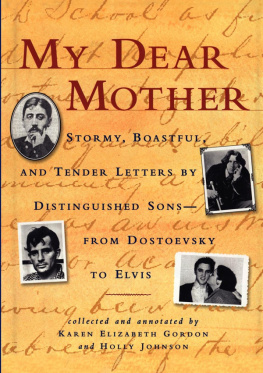
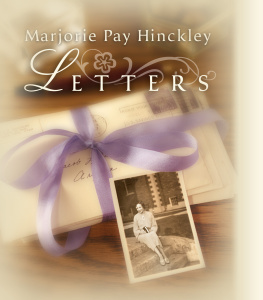
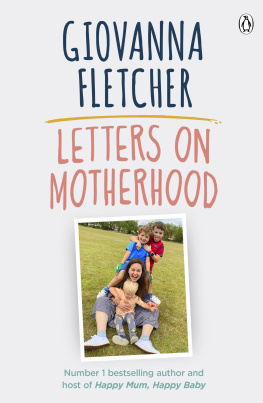
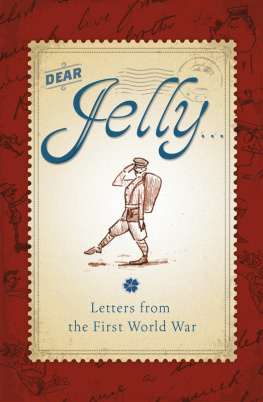
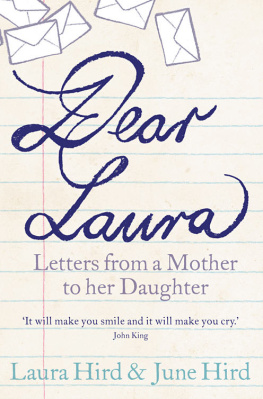
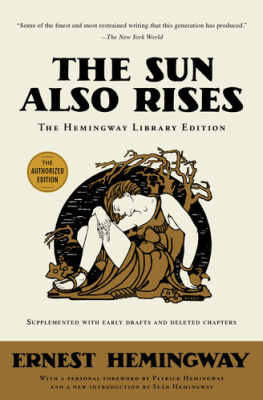

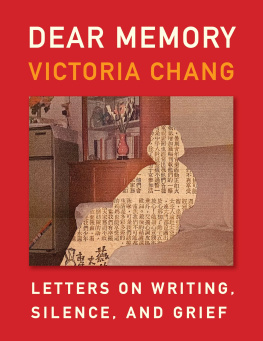
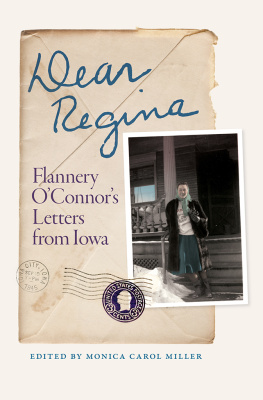
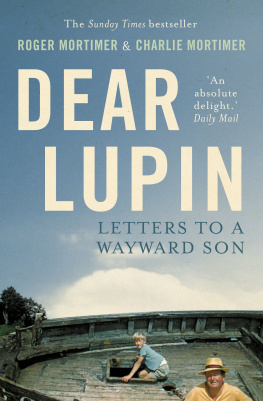
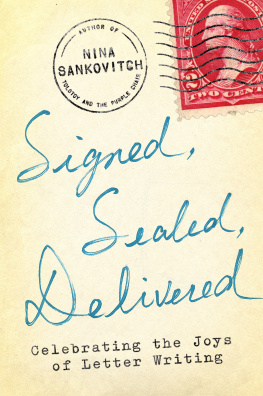




 tel des Grandes Ecoles, Alain Bloch, The American Library in Paris, Maia Gregory, Herbert Schimmel, Pat Nolan, Barbara Hodgson, Frank Marquardt, Grace Fretter, Steven Moore, Alba Witkin, Camilla Collins, Paul Walker, Peter Guralnick, Patroclos Stavrou, and Richard Press.
tel des Grandes Ecoles, Alain Bloch, The American Library in Paris, Maia Gregory, Herbert Schimmel, Pat Nolan, Barbara Hodgson, Frank Marquardt, Grace Fretter, Steven Moore, Alba Witkin, Camilla Collins, Paul Walker, Peter Guralnick, Patroclos Stavrou, and Richard Press.
